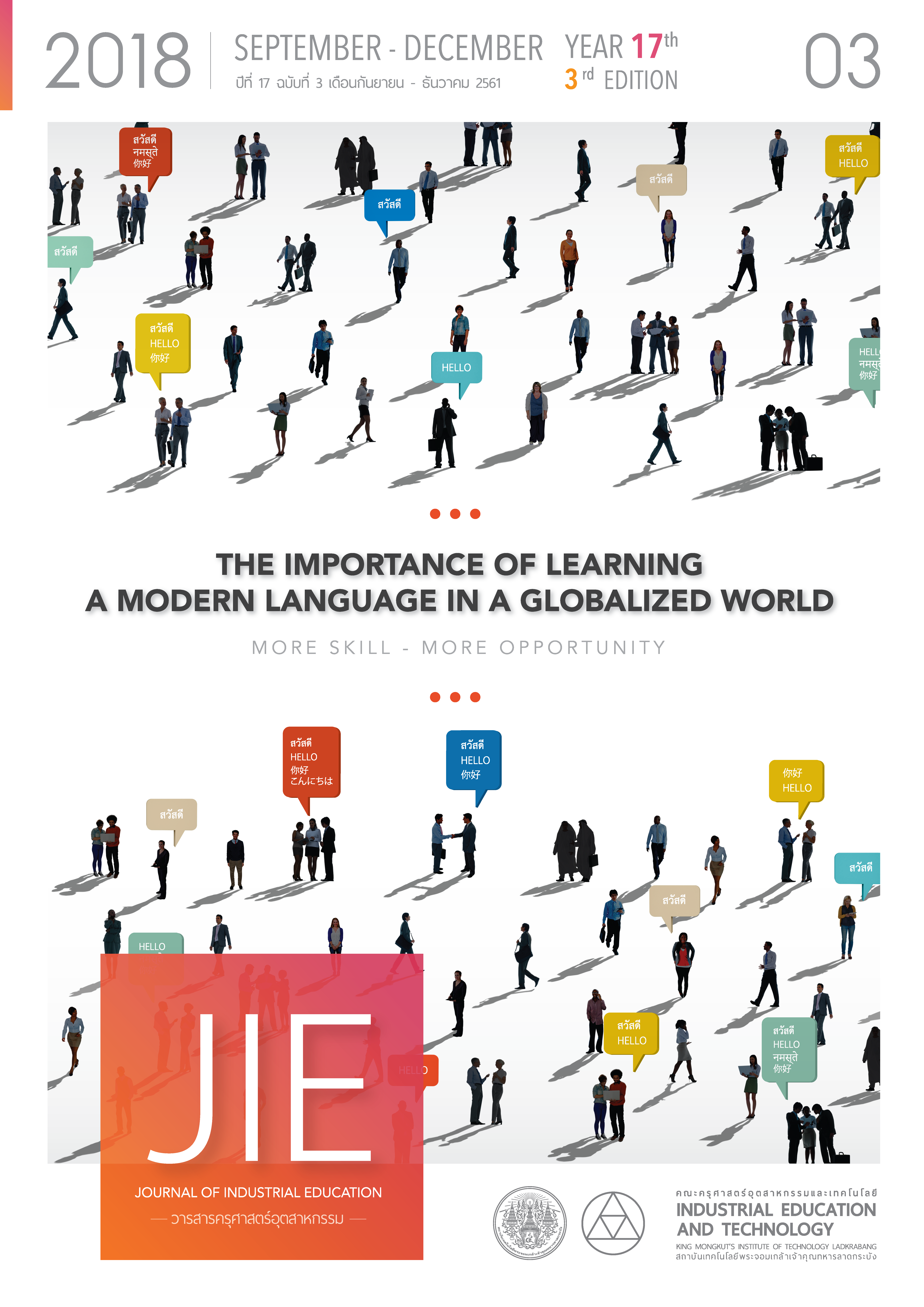THE DEVELOPMENT OF WEB-BASED INSTRUCTION ON ELECTRONIC FUEL INJECTION SYSTEMS OF MOTORCYCLE FOR UNDERGRADUATE STUDENTS OF SMALL ENGINE AND MOTORCYCLE PRACTICE
Keywords:
web-based instruction, Electronic Fuel Injection System of MotorcycleAbstract
The objectives of this research were 1) the develop a web-based instruction (WBI) on "Motorcycle Practice that has quality and efficiency aligned with the 80/80 regulation" 2) compare the learning outcome of students before and after undertaking the developed WBI on " Motorcycle Practice" 3) study the students’ satisfaction on learning method by using the developed WBI. The sample consisted of 18 second-year Undergraduate students with a Mechanical engineering major, Faculty of Industrial Education at Rajamangala University of Technology Isan (Khon Kaen Campus). All the students were enrolled in "Small Engines and Motorcycle Practice" course during the 1st semester of the academic year 2019. The instruments, including the developed WBI, a quality-based evaluation questionnaire for WBI, with multiple choice 4 options, and an achievement test comprised of 50 items to indicate index of Item-Objective congruence (IOC) between 0.65 to 1.00, the difficulty between 0.23 to 0.76, the discrimination between 0.21 to 0.72, and the reliability coefficient of 0.83, the questionnaire of students’ satisfaction after learning using the developed WBI. The statistics used for data analysis were percentage, mean ( ), standard deviation (S.D.), and t-test for dependent samples. The results were found as follows: The quality of the content contained in the developed WBI was in a very good level ( ≥ 4.61, S.D. = 0.65), the quality of media development technique was also in a very good level (
≥ 4.67, S.D. = 0.50), which results in a very good level overall quality (
≥ 4.55, S.D. = 0.81). The effectiveness (E1/E2) of the developed WBI was found at 85.00/80.44, which was within the expected criteria. Moreover, the learning achievement after undertaking the developed WBI was statistically higher than before taking the lesson at 0.05 level. As a whole, the students' satisfaction after learning through the developed WBI on "Motorcycle Practice"
was at a high leve ( ≥ 4.51, S.D. = 0.60), according to the hypothesis research.
References
Panuwat Srichailard and Karich Shinthanakul.2017. The Development of a Blended e-learning Programs and Competency Based Plan for an internet Administration and Service Course for Computer Education Students. Journal of Industrial Education, 16(3), p. 66-74.
Anant Voratitipong, Panita Wannapiroon, Prachyanan Nilsook.2019. A Study of Digital Media Searching Systems. International Journal of e-Education, e-Business, e-Management and
e-Learning (IJEEEE), 3(9), p. 204-211.
Pisutta Arreerard, Prawit Simmatan, Pongtorn Phopulsak.2010. The Effects of Interactive Learner-Centered Model through Computer Network. Report of Classroom research, Faculty of Information Technology. Mahasarakham: Rajabhat Mahasarakham University.
Chaiyong Brahmawong.2013. Developmental Testing of Media and Instructional. Silpakorn Educational Research Journal, 5(1), p. 7-19.
Surnitchai Kanhakhun.2008. A Development of the Web-Based Instruction on Electronic Control System in Electronic Engine Control System Subject for Higher Vocational Education Certificate Level. Master thesis, M.Ed. (Curriculum and Instruction).Sakon Nakhon: Graduate School, Sakon Nakhon Rajabhat University.
Pornsawan Insorn.2004. A Development of WBI on Electrical Automotive System for Certificate in Vocational Education. Master thesis, M. Ed. (Computer Technology).Bangkok: Graduate School, King Mongkut’s Institute of Technology North Bangkok.
Eakarach Chaiphia, Traitot Kaewngao, Anumut Siricharoenpanich.2018. The Development of Web-based Instruction on Electronic Fuel Injection Systems of Motorcycle for Undergraduate Student of Small Engine and Motorcycle Practice. Journal of Industrial Education, 17(3),
p. 54-62.
Wiches Nuntasri and Krich Sinthanakul.2019. The Development of a Blended e-leaning Model on Competency-Based Using MAIP Method in Process for Undergraduate Students in Computer Education Program Journal of Industrial Education, 18(3), p.71-79.
Apinya Burisri.2011. A Development of Content and Activity Blended Learning Model on Computer Programming. Princess of Naradhiwas University Journal, 6(3), p. 133-143.
Sangdao Sankumrang, Chaiyot Ruangsuwan, Paitool Suksringam. 2010. Comparisons of Learning Outcomes Using the Courseware Entitled Thai Music of Mathayomsuksa 1 Students with Different Self-directed Learning. Rajabhat Maha Sarakham University Journal, 10(1), p. 73-82.
Pichai Thongdeelert.2003. A Prosed Collaborative Learning Model on Computer Network-Based Leaning for Undergraduate Student with Different Leaning Styles. Degree of Doctor of Philosophy thesis, Ph.D. (Educational Communications and Technology).Bangkok: Graduate School, Chulalongkorn University.
Thanasak, Sittichai, Sittichai Bussaman, Kanjana Khamsombut.2017. Developing a Web-Based Instruction Program by Using the Team Game Tournament Cooperative learning Model of “Introduction to Electricity and Electronics Course” for the First Year Vocational Certificate Students. Rajabhat mahasarakham University Journal, 8(3), p.221-229.
Downloads
Published
How to Cite
Issue
Section
License
"The opinions and contents including the words in papers are responsibility by the authors."
"ข้อคิดเห็น เนื้อหา รวมทั้งการใช้ภาษาในบทความถือเป็นความรับผิดชอบของผู้เขียน"



